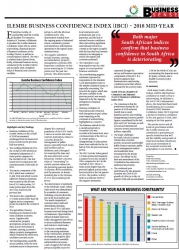iLembe Business Confidence Index (iBCI ) - 2018 Mid-Year2018-09-14 Enterprise iLembe, in partnership with the iLembe Chamber of Commerce, Industry & Tourism, collaborate to produce the iLembe Business Confidence Index (iBCI), aimed at providing a biannual picture of business confidence in the iLembe District, as well as an overall business outlook. The iBCI is a hybrid index derived from, firstly, a biannual business survey conducted in the iLembe District and secondly, with a weighted index of financial and economic variables.
Highlights and key findings
Both major South African indices confirm that business confidence in South Africa is deteriorating. In addition to the SACCI BCI summarised above, the Rand Merchant Bank (RMB)/Bureau for Economic Research (BER) Business Confidence Index (BCI) reported a decline in business confidence in the 2nd quarter of 2018, after surging in the first quarter. The private sector and all levels of government within the iLembe District are committed to partnering on specific initiatives that will aid the viability and growth of small and medium enterprises and secure investment in key economic sectors and geographies in our district. Enquiries Nathi Nkomzwayo, CEO, Enterprise iLembe, nathi@enterpriseilembe.co.za Cobus Oelofse, CEO, iLembe Chamber of Commerce, ceo@ilembechamber.co.za Richard Downing, Economist, Econdow, econdow@axxess.co.za |
iLembe Business Confidence Index (iBCI ) - 2018 Mid-Year
Copyright © 2024 KwaZulu-Natal Top Business
